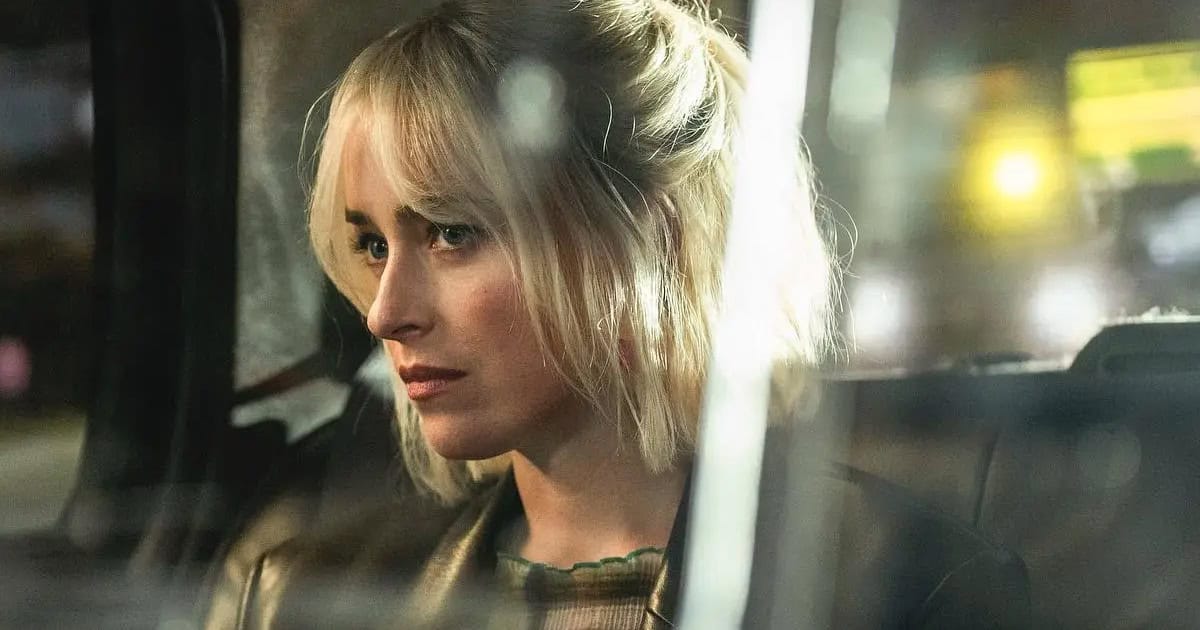Sean Penn and Dakota Johnson star in this dialogue-driven two hander about a loudmouth cabbie and his passenger.

PLOT: A woman (Dakota Johnson) and a talkative cabbie (Sean Penn) have a deep conversation while stuck in an endless New York traffic jam.
REVIEW: A few months ago, Dakota Johnson suffered the worst reviews of her career for her superhero flop Madame Web. She’s been open about how she’ll never do anything like that again due to how badly she felt burned by its reception, doubling down on her commitment to indie fare. Indeed, if you watch Dakota Johnson in Daddio, a movie she co-produced, you can see how effective she can be if given material that suits her.
Written and directed by Christy Hall, Daddio is a two-hander one that takes place entirely in a cab travelling from JFK International Airport to an apartment in Manhattan. The film revolves around Johnson’s unnamed passenger, billed as “girlie,” a young woman returning to New York after a trip to see her sister. She stumbles into a cab being driven by Clark (Sean Penn), an extremely talkative cabbie who’s been around the block a few times. When stuck in a traffic jam, the two, out of boredom, start to open up to each other about their lives.
Hall’s film is almost like a play in that it’s essentially just a ninety-minute dialogue scene. It takes a while to settle into its rhythm, but Daddio becomes a fairly compelling slice of life once it starts going. Johnson’s character is at a crossroads in her life, with her returning to Manhattan and her married lover, but unsure of the path she wants to follow. While speaking with Clark, she’s still engaging with her older lover, who’s drunk, texting her and asking for erotic photos, which she obliges him with.

Penn has his best role in years as Clark. While plain-spoken, he seems through “girlie’s” polished veneer, getting her to admit the kind of relationship she’s in, which he knows all about. As he explains to her, he’s been married twice and has lots of experience having affairs outside of marriage. He tries to explain to her why, even if she thinks she loves her married boyfriend, the man will never leave his wife and ultimately views her as a sexual plaything. All this is confirmed by the messages he sends her over and over.
What’s interesting about Hall’s film is how it takes pains not to be overly judgmental. While it’s made clear that Johnson’s character seems toying with the notion of breaking up a marriage, she’s still a good person motivated by love (or at least what she thinks is love). Penn’s Clark initially comes off as a misogynistic loudmouth, but as the film goes on, we start to realize that underneath all of his bluster, there’s a lot of hard-earned wisdom there, which he’s not shy about doling out. Our protagonists are ultimately good, kind people, with Penn rarely this warm and affable on-screen.
Daddio made its debut at TIFF in the fall and was well-received, with Hall moving on to write the adaptation of the highly anticipated Blake Lively film It Ends With Us. In Daddio, she shows an incisive view of human nature, with her warts-and-all portrait of these two humans making a brief, fleeting connection that is surprisingly life-affirming. Most importantly, the connection feels authentic, and neither is shown to be a sage know-it-all. They’re simply two people stuck together for ninety minutes who take the opportunity to have a meaningful conversation. By the time the credits roll, neither of them seems on the verge of changing their lives, but they both at least met someone else who empathizes with them, which, at times, can be something we all need. Daddio isn’t the kind of movie that will blow you away, but it is food for thought and a surprisingly compelling two-hander for two performers often pigeonholed into specific roles.


